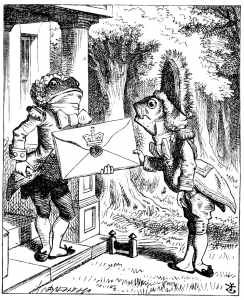The Power of Vacuum: A Whackadoodle lesson on what it takes to budget your time, why recording your schedule helps to eliminate waste, and how you can MASTER your goals. If you have entered this story in the middle, click here for the table of contents.
“So I still don’t understand why you decided to call rule six the Power of Vacuum,” she told me as soon as she sat down. “I personally think you should have called it the Problem with Sand.”
“So you liked the sand metaphor?” I couldn’t help but laugh.
“Sure,” she said. “It’s a good way to explain how our time gets filled up.”
“It’s not my metaphor,” I reminded her. “It’s a pretty standard story told in many time management seminars. I’ve told the story myself in the seminars that I’ve taught. It always begins with someone having seen the original performed, but I have never seen it done. I have only heard the story, which I suspect is made up. To actually perform it would be too much work and much too messy.”
“So how does the original story go?”
“The story always begins with the words, ‘I went to this time management seminar;’ then they explain how the speaker began by pulling out a large aquarium that the speaker began to silently fill with rocks. Once the aquarium seemed full, she would turn to the audience and ask, ‘Do you think it’s full?‘” I looked at my student expectantly.
“I suppose it seemed full,” she offered.
“Good,” I nodded. “At which point, the speaker would call an assistant to bring in a bag of gravel, and begin pouring it into the spaces between the rocks. Once she had those spaces filled, she would turn again to the audience and ask, “Is it full now?“
“And the audience would answer, what?”
“It would vary,” I replied. “Some said yes, some said no. Meanwhile, assistants would come on stage with bags of sand and begin filling in the gaps between the gravel and rocks. Once all the gaps were full, the speaker would turn to the audience again to ask, “Is it full now?“
“I suppose that the audience would give a similar response?”
“Pretty much,” I confirmed. “Then the assistants would come back and begin filling the aquarium with water all the way to the brim. Finally, the speakers would turn again to the audience and ask, “What’s the point?“
“Let me explain the point,” she offered, waving her hands in excitement. “I wanna see if I get it right.”
I nodded, so she continued. “The rocks represent the important and urgent tasks in your life; they have to get done right away. The gravel represents stuff that is important to you, but not urgent, so we tend to put it off. The sand represents stuff that is not important to you, but feels urgent because someone else is asking it of you. Finally, the water represents everything not urgent and not important, so really it is just a waste.”
“Good explanation of what each ingredient stands for,” I smiled. “But you failed to explain the point.”
“The point is that you need to load your daily schedule in order,” she went on emphatically. “Critical rocks first, important gravel next, other people’s sand third, and water last. If I put the water, gravel, or sand in first, I would never have time for the rocks.”
“In other words?” I prompted.
“In other words,” she paused to consider. “Take some time to budget your time before it fills up with other people’s sand.”
“Pretty good,” I smiled. “And do you remember the problem?”
“That most people don’t take the time to budget their money, let alone their time,” she added after a moment. “I suppose most people haven’t been taught how to budget.”
“Or they haven’t been taught how important budgeting time is.”
“Is that why you include that schedule sheet in your online lessons?” she asked. “Because you want people to keep a schedule?”
“I just think that people should occasionally keep a record of how they spend their time, so they know how they have been spending it.” I corrected. “You might even consider it your homework for this week. Once people realize how important keeping records can be, they might just want to make record keeping a habit.”
“Oh crap,” she said. “Let me see if I can download the thing.” She took a moment to download and read. “So, am I supposed use this form to keep a record of how I spend my time this week?” she asked after taking it in.
“Use this form, or make your own,” I replied. “But yeah, spend some time considering whether you are spending your time on crisis, quality, illusion, or waste. When you keep a record of how you spend your time, you more likely to spend your time well.”
“What is this thing on the bottom about MASTERed goals for the week?”
“I’ve told you about MASTERing your goals,” I reminded her.
“Yeah,” she mumbled. “I should not say that I will lose ten pounds this month because I am not accountable for how my body metabolizes calories. Instead, I should commit to walking a mile each day, and limiting my calorie intake to 2000 per day. If I do that, I should lose more than ten pounds each month, and eventually reach my perfect weight. That way my goal is MASTERed, meaning: Measurable, Accountable, Specific, Timely, Exciting, and Realistic.”
“You could not sound less excited by your goal,” I told her. “In fact, you sound down right bored by it.”
She stared at me for a second. “So are you saying that I will not keep my goal because it is not exciting?”
“I’m just saying that when a goal is exciting, it’s much easier to keep. It’s one of the reasons that marathons are so popular” I suggested. “It’s much more exciting to be training for a marathon than to be walking to lose weight.”
“I suppose,” she agreed, “But the last thing I want to do is run in a marathon. I don’t like to sweat.”
“Fair enough,” I laughed. “Neither do I, but I do love to swim, so maybe finding a partner to swim with every few days might be a more exciting goal if my objective is to get myself into shape. I also love to ice skate, so perhaps I could try to make ice skating a weekly goal. Of course I would have to be realistic with my time and money, so maybe I could only afford ice skating once a month, or maybe just on my birthday. Then there’s bowling. I have always loved bowling. Perhaps I should set a goal to contact the local bowling alley to see if they have any leagues that I could join.”
“You are so weird,” she said, not for the first time.
“If I don’t set the goal to have my sixty-second birthday at the neighborhood ice rink with as many friends that I can talk into joining me, then my goal will never happen. I will probably spend my next birthday like I spent my last one.”
“And how was your last birthday spent?” she asked.
“Pretty much forgotten,” I said. “But that was my fault, not theirs. It’s easy to forget stuff when you don’t create objectives that actually mean something to you, and then turn them into MASTERed goals.”
“Objectives that mean something to you?” she repeated back.
“Yes,” I confirmed. “You begin with an objective, big or small. I want my next birthday to be amazing, or I want more people to come out and vote this year. Next you create specific MASTERed goals that help you reach your objective. Finally, you check off what you have done to see if your MASTERed goal moved you toward your objective.”
“I still get confused about whether or not my goals have been MASTERed.”
“You’re not alone,” I shook my head sadly. “I was always surprised, when I taught the subject, just how many of my students couldn’t write a MASTERed goal. Too often their goals didn’t excite them. Too often they wrote goals where they had no accountability for the outcome. Too often their goals were not realistic, or timely, or measurable, or specific.” I took a deep breath, and looked into my student’s eyes. “Goals that are not MASTERed just set you up for failure. It’s just one more chance for you to fail yourself.” She stared at me, seemingly at a loss for words, so I added. “Don’t ever make a promise to yourself that you don’t have the ability to keep.”
“So you think that goals are promises that I make to myself?” she asked softly.
“Yeah,” I nodded. “I also believe that you should never make a promise that you don’t intend, or are not able, to keep.”
“So maybe my first MASTERed goal should be to finish the homework you gave me,” she said as if making a promise to herself. “I will use this form to record how I spend a week’s worth of time, so that will I know how much time I spend in crisis, quality, illusion, and waste,” then she looked up to stare me in the eyes. “And you had better be here to review it with me next week,” she added.
“Have I ever done otherwise?” I replied.
*********
Navigating a Whackadoodle World: Episode Seven
The Power of Process and Growth
********
If you would like to have me email you our next episode once it’s gets posted, please join our mailing list.
________
If you you enjoyed this post, please leave a comment below. It helps our algorithm.
It would also be great if you shared this post. It also helps our algorithm.
If you would like to join Lynn’s mailing list, or ask a Dear Navigator question click here

You can reach Lynn Marie Sager at
DearNavigator@gmail.com
Author:
- Navigating Life in a Whackadoodle World
- Finding Sense in a Whackadoodle World
- Teaching Logic in a Whackadoodle World
- Navigating Life Through Turbulent Tides
- A River Worth Riding: Fourteen Rules for Navigating Life


I’m a master planner. I’m even a better procrastinator.
For instance I blocked out time to work on family finances today.
What I’ve worked on is reading and commenting on this post.
Trying to set up an new software I think will help my planning and trying to resolve a problem buying my favorite notebook on line.
I always block out time but end up working on what triggers my interest at the moment. Then I can’t remember what I was working on half an hour ago. If I want to remember it I have to take notes. when I finish reading I review my notes to make sure they make sense. Then that evening a rewrite the key points in my own words. One keyword to a note. Each week I review my notes. Are they important enough to keep? Are they something I want to take action on? If I want to keep them but don’t want to take action they go in the someday folder. I never have more than 5 things i my Action folder.Everything else goes in my Next Up folder. I find using pen and paper works better for me than any app I have found.